
Webinar: 28 july 2022
On 28.07.2022, the Maritime Security Forum held a webinar on “Reflections on the new NATO Strategic Concept and its importance for the Black Sea region”. The event had as guest of honour Lieutenant General Vasile Toader, Romania’s military representative to NATO and the EU, and brought to the debate issues related to the adoption of the 8th Strategic Concept in the more than 70-year history of the North Atlantic Alliance.
The participants debated with the guest issues related to NATO’s strategy for the next decade, the fundamental security tasks assumed by the Allies, taking into account the challenges and opportunities the Alliance is facing today, as well as the strategic importance of the Black Sea region in the context of the NATO 360 approach. In their comments, the participants made extensive references to the security situation in the Black Sea and offered solutions on combating threats in the maritime domain, citing issues related to the equipping and training of naval forces, the need to strengthen Allied surveillance and cooperation at sea, as well as issues related to the barriers imposed by the Montreaux Convention.
At the end of the event, the President of the Maritime Security Forum spoke, stressing once again the importance of adopting the new NATO Strategic Concept for the Alliance in general and for our country in particular, as well as the need for a more sustained effort in promoting security measures in the Black Sea, and thanked Lieutenant General Vasile Toader for his analysis and personal comments.
With each activity the Maritime Security Forum brings you closer to the naval domain and invites you to reflect more deeply on the security of the Black Sea region.
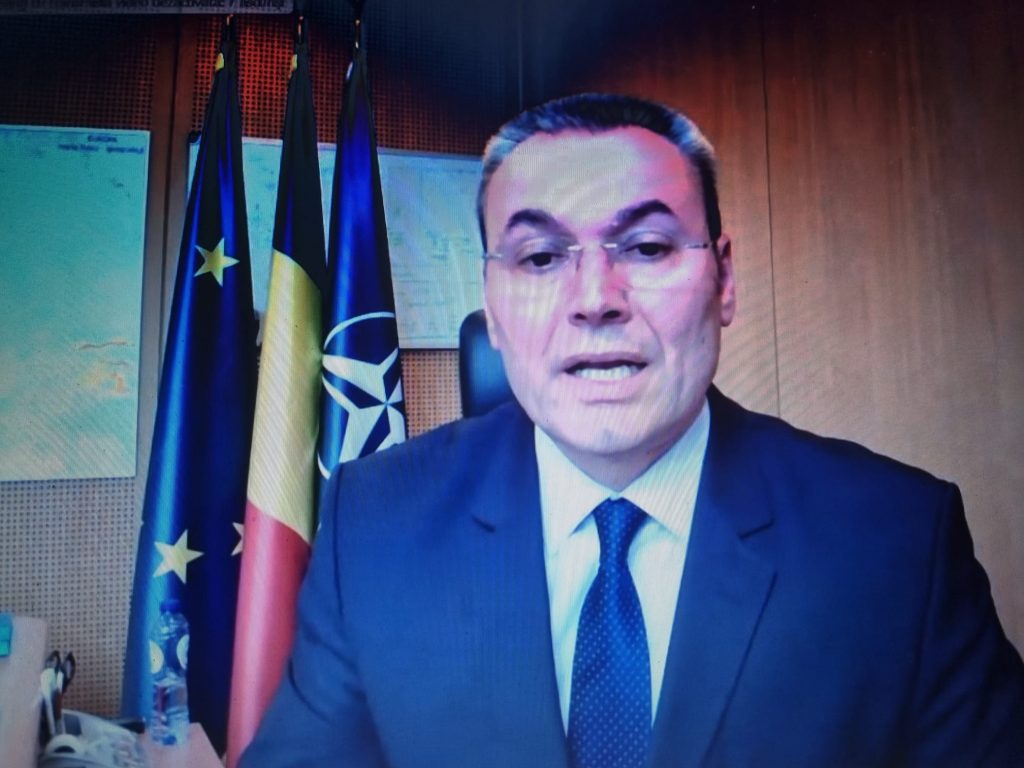
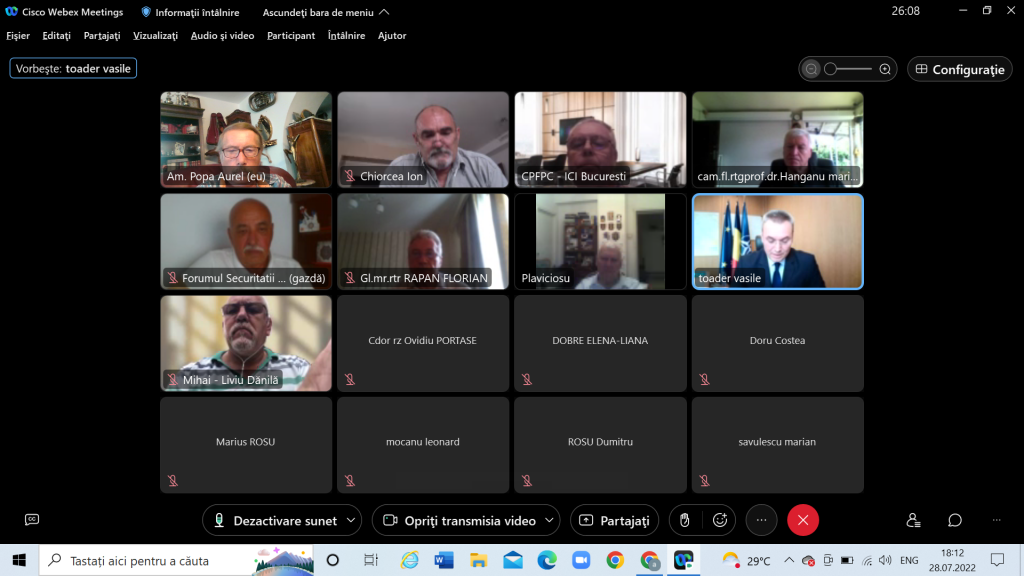
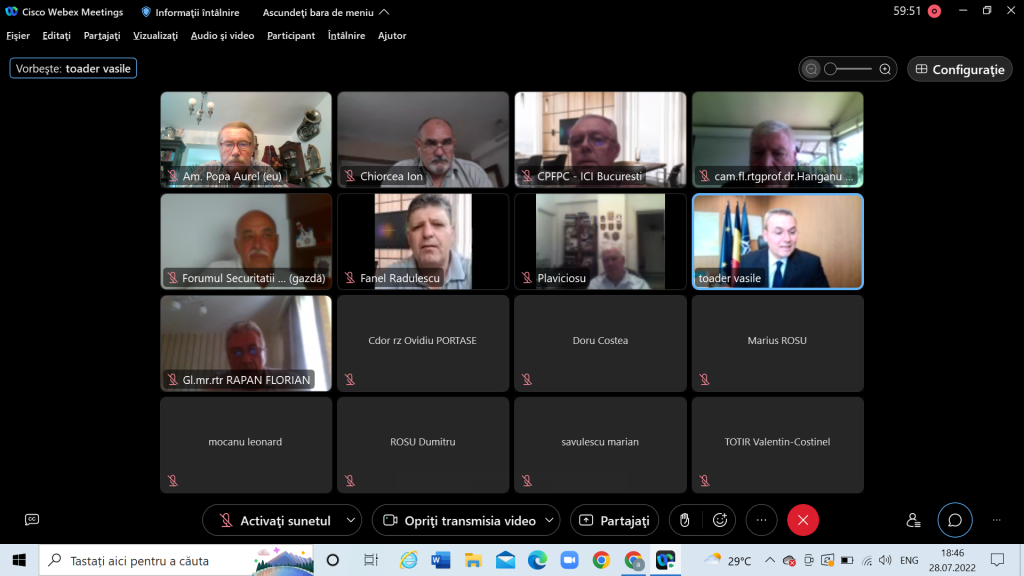
webinar: 12 July 2022
On Tuesday 12 July 2022, the Maritime Security Forum organised an information activity on the theme: Black Sea Security from Ukraine’s perspective.
Our guest was captain (ret) Andrii Oleksiyovych Ryzhenko – expert of the Centre for Defence Strategies (Ukraine) – https://defence.org.ua/.
The briefing under the title “War in Black Sea” presented the maritime component of the war in Ukraine, in particular the most important tactics and naval actions of the aggressor Russia, but also elements of action and counteraction of the Navy from the perspective of the aggressed Ukraine.
Lessons identified and learned in a short time allowed the adaptation of action procedures to counter Russian forces.
Starting from the analysis of the Ukrainian-Russian force ratio and continuing with the presentation of the naval framework in the Eastern Mediterranean and Black Sea region, Commander (rz) Andrii Oleksiyovych Ryzhenko presented several topics for analysis and reflection.
Russia has relied on the design of naval forces, especially missile-based capabilities in
Sea of Azov and the northwestern Black Sea:
Warship deployment and patrolling;
Cruise missile attacks against designated coastal targets;
Air strikes;
Underwater sabotage operations;
Amphibious operations
Ukraine opposed the operation to blockade the Azov Sea and the northwestern Black Sea, through actions against surface ships, control of sea lines of communication, capture of the Serpents’ Island, and military build-up.
The MNF/Russia naval operations demonstrate the aim of gaining control over the northwestern part of the Black Sea and Ukraine has developed coastal defence capabilities, executing sea control over Ukraine’s littoral waters, conducting credible air defence, ensuring effective protection of ports and naval bases, operations against underwater saboteurs as well as anti-landing amphibious activities. Denial of sea control in the north-western Black Sea was achieved through action: MDA (Maritime Domain Awarness) EW (Electronic Warfare), Sea Mines and ASM (Anti Ship Missile).
How is Ukraine defending itself ?
Some successful actions were presented, such as:
LST Saratov (Aligator-class landing ship) was sunk, two Ropucha-class landing ships were damaged (Berdyansk seaport, 24 March)
The cruiser Moskva was hit by two Neptun anti-ship missiles on 13 April. The ship sank on 14 April while being towed to Sevastopol.
The Marines make a solid contribution, with the Mariupol and Kherson cases featured.
Snake Island
Russia:
Revives the old Soviet concept of the 1950s-60s and sees the island as an important outpost of military presence near southern Bessarabia and the mouth of the Danube;
Destroyed the bridge over the Dniester estuary by missile strikes in order to isolate the South Bessarabian enclave from the Odessa region;
Attempts to build military power on Snake Island, blocking the Danube and the Dnieper.
Ukraine:
Successfully provoked strikes against Russian SLOCs on Snake Island, landing craft and auxiliary vessels attempting to deliver air defense systems and military personnel to the Island (26 April – 20 June);
Maintain safe all other road links with the South Bessarabian enclave;
Executed continuous artillery strikes for 10 days on the island and forced the enemy to retreat.
Grain crisis
Grain ships normally move between 30,000 and 50,000 tons, move slowly at 12-15 knots are easy targets for missile strikes by Russian warships and coastal missile batteries based on the west coast of Crimea. It should make the 180 km (97 miles) journey from Odessa to NATO member Romania’s waters, staying close to the Ukrainian coast. Anti-ship missiles (Neptune, Harpoon) allow cover by hitting aggressor ships launching anti-ship missiles, but will not be able to close the airspace against attacks by enemy anti-ship missiles (coastal and sea-based) and fighter aircraft.
Escort warships with missile defence capabilities are needed to provide convoy protection against Russian anti-ship missiles and fighter aircraft.
Ukraine has no such ships. The HIMARS systems are equipped with high-precision MGM-140 tactical missiles, but with a range of up to 300km, and are a modest version – those with ranges of up to 500km are needed, and are capable of hitting Russian Bastion missile batteries in Crimea.
Conclusions
Ukraine has gained the ability to repel the enemy offshore to the sea. Neptune and Harpoon missiles undermined the viability of Russia’s original operational design, 10 Russian warships and craft were destroyed, 6 – damaged by Ukraine using ASM and UAV Moscow lost Snake Island and some impact in the northwest Black Sea and Danube.
Russia has moved its warships closer to the Crimean coast under the protection of its own missile defence system, continues efforts to stop Ukraine’s access to the sea and capture southern (coastal) territories: air strikes with missiles continue on Ukraine’s coast but also on continental targets.
Tor-M2 GBAD (SA-15) ground system installed on board ships to enhance their missile defences.
Maintains blockade of Ukraine’s seaports.
Still preparing for amphibious disengagement operation (intelligence, sabotage, mines).
Commander (rz) Andriy Ryzhenko, retired from the Armed Forces of Ukraine in the rank of Commander, served over 35 years at sea and ashore on board surface combatants, in the Ukrainian Navy Command in the field of maritime tactics and PfP exercises, planner in the field of defence and strategy. He also worked on the transformation of the Ukrainian Navy by implementing Euro-Atlantic standards and contributed to NATO-led operations and NATO Response Forces. He served in NATO in the area of Partner Nation Unit Assessment Methodologies (OCC E&F) at SHAPE (Mons, Belgium) and developed aspects of Ukraine’s National Security Strategy in the maritime domain.
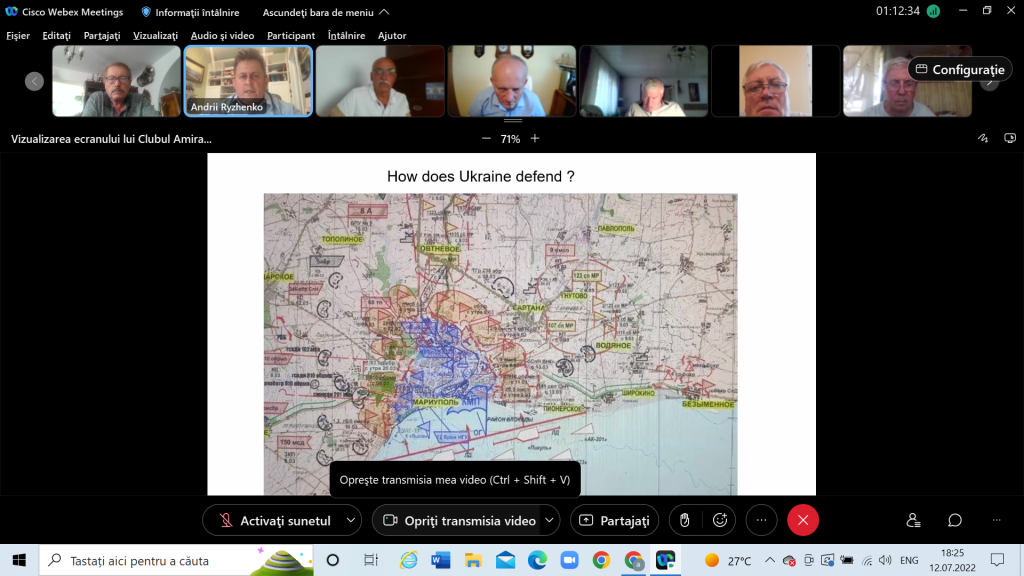
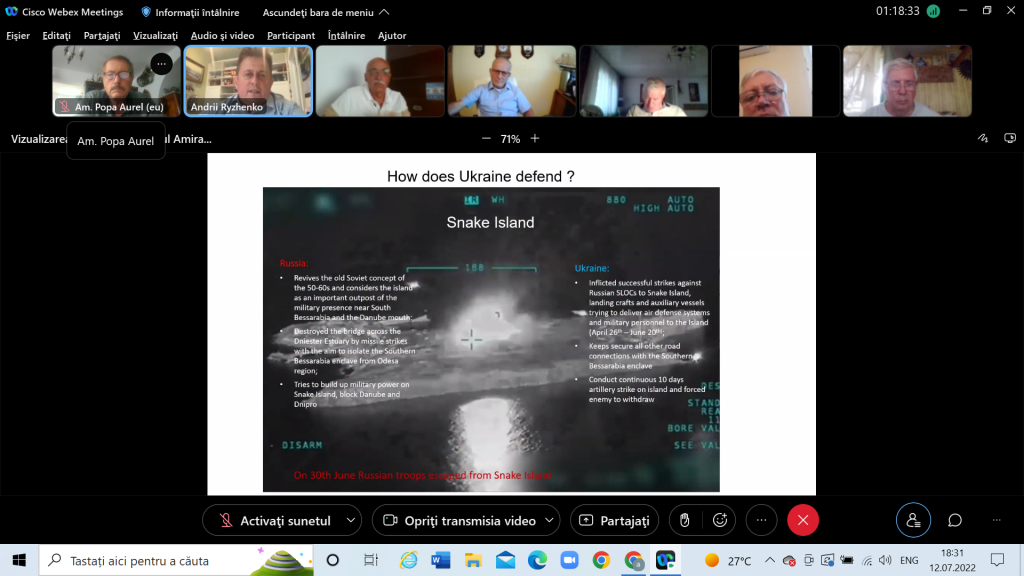
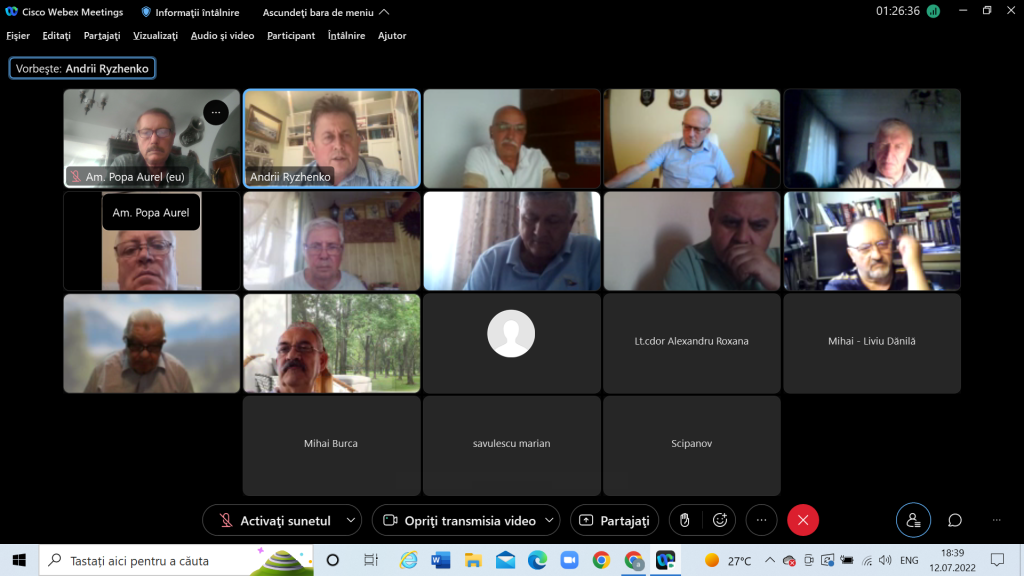
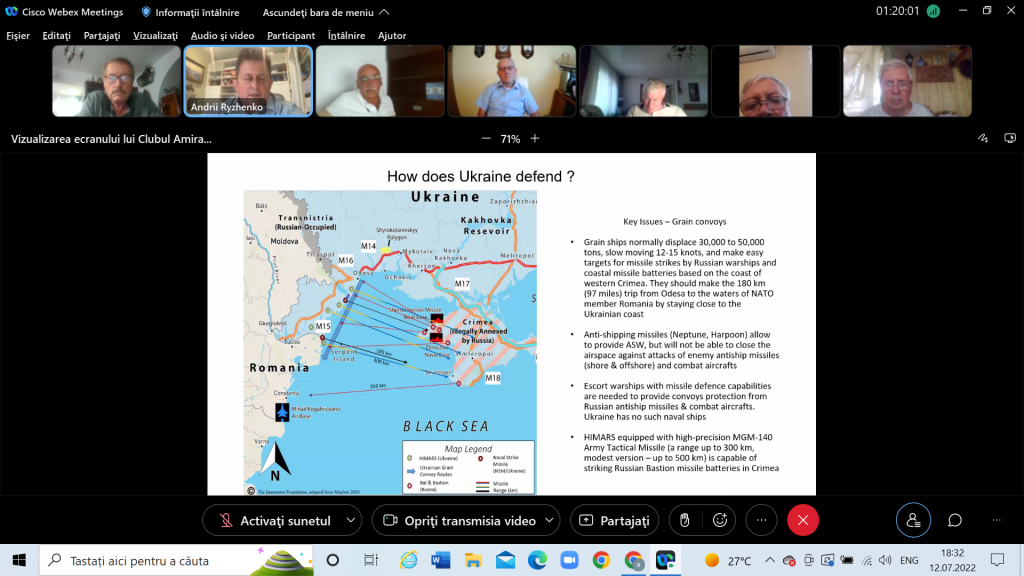
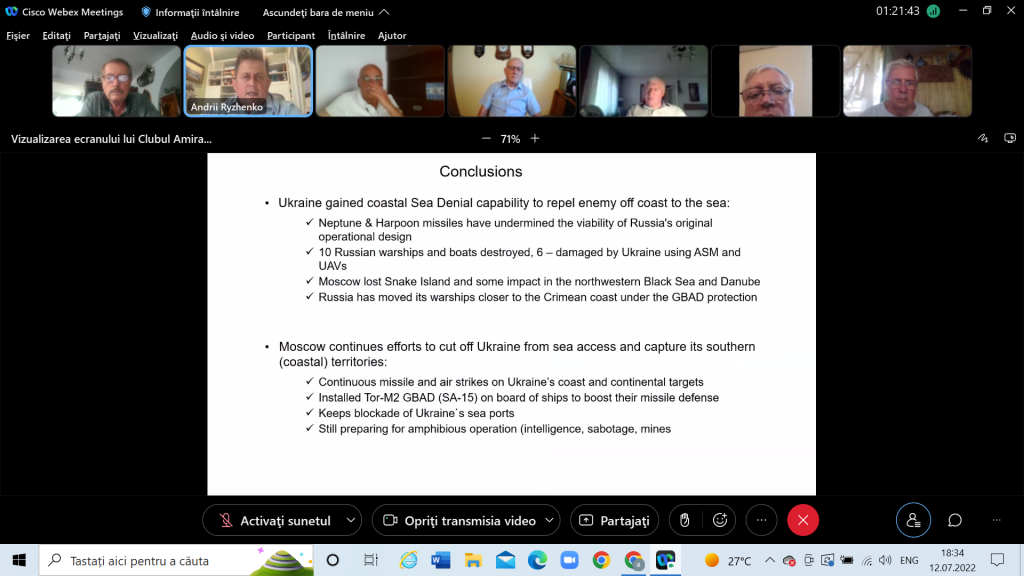
webinar: 30 June 2022
The Maritime Security Forum organised on Thursday, 30 June 2022, the presentation of papers followed by debates on the evolution of the Danube navigation regime and its importance for Romania. The Danube, or Europe’s green motorway, is an essential and strategic European transport corridor for Romania and the whole of Europe, especially in the context of the war in Ukraine. Hence the need for an analysis of the subject, both from the point of view of civil transport, military aspects, as well as the need for cooperation at European level, but also bilaterally with future EU countries. The evolution of the navigation regime has been permanently in the attention of specialists, as a necessity to keep this European transport artery in operation. The Romanian people has evolved indispensably linked to the geographical settlement, the Danube representing the link between the peoples of Western and Central Europe. If geographically the Danube ends at its mouth, economically it empties into the Mediterranean: in the Delta it discharges its waters, in the Mediterranean it takes its ships. Without a free outlet to the Mediterranean, the Danube cannot fulfil its role in world trade. Recognised as an international river at the Congress of Vienna (1815), the Danube provided Romania with the opportunity for an ambitious naval programme which, after 30 years (in 1989), had resulted in an important maritime (9th in the world) and river fleet (the largest in Europe and second largest in the world after the USA.
The paper “Romania and the Republic of Moldova together on the Danube and the Black Sea” presented by Prof. Romeo Boșneagu succeeded in highlighting the situation of the Republic of Moldova, a country without a direct outlet to the Black Sea, which today has the necessary assets to develop as a coastal state on the Black Sea, through an intelligent and flexible policy, creating the political conditions for the rapprochement with Romania and the European Union, in the context of receiving the status of candidate country for accession. Based on the analysis and interpretation of representative statistical data, the paper succeeded in bringing to the attention of the participants the need for a unified approach, based on common interests, to the European path of Romania and Moldova
Towards the technical aspects specific to the regulation of the navigation regime on the Danube, Mr. Georgel Negrea – Head of the Navigation Safety Service/NAVROM SA, clarified the aspects related to the evolution, problems and future projects of this particularly important field for the development and efficiency of river transport at European level, thus revealing the importance of the European corridor .
Rear Admiral Cornel Rogozan succeeded in clarifying the legal and historical evolution of the navigation regime on the Danube, in the context of international and national interests. These landmarks do nothing more than clearly underline the role played by Romania, but above all the following objectives.
The presentation of the maritime geopolitical situation was not lacking, as Rear-Admiral Dr. Constantin Ciorobea managed to present the main maritime events of the war in Ukraine. At the same time, the interpretation and the resulting conclusions allowed the participants to understand the logic of maritime actions in the general geopolitical context.
During the discussions that followed, Mr Vasile Simileanu (graduate of the Faculty of Geography, graduate in communication and public relations, founding director and senior editor of GeoPolitica magazine), intervened to clarify some issues related to interpretation at the international political level, especially from the point of view of the countries interested in the topics discussed.
The activity was attended by a wide and diverse participation from various fields of activity.
26 May 2022
The Maritime Security Forum, part of the Admirals’ Club, organised on Thursday, 26 May, a seminar dedicated to the current geopolitical situation and the debate on the subject of the Black Sea security triangle: NATO, Russia, EU, with reference to the role played by Romania. The seminar was moderated by Mr. Cam PhD. Constantin CIOROBEA and had as guests Mr. Gl. bg. (rz) PhD. Mircea MÎNDRESCU – President of the Executive Academic Committee of the European Security and Defence College and Mr. Gl Liviu Mihai DĂNILĂ – TAIEX Expert of the EU COM, Head of the Centre for Special Emergency Situations of the MFA. We particularly appreciate the participation and contribution of Gl. (rz) PhD. Ștefan DĂNILĂ – former Chief of the General Staff, whose contribution allowed a better understanding of the political-military decision-making mechanism. The event provided an opportunity to conduct analyses and debates on the current geopolitical situation, in correlation with Romania’s current and future needs and interests, and was attended by the Forum’s experts as well as its supporters, concerned or involved in the field of maritime security. Following the debates, particularly interesting and important conclusions were drawn for the clarification and substantiation of a Maritime Strategy for Romania, with coherent and consistently argued elements.
28 April 2022
On April 28, the Maritime Security Forum organized an event moderated by Admiral (rtr) PhD. Aurel POPA – President of the MSF, with the participation of Commander Prof. PhD. Ioan CRĂCIUN – President of the Scientific Council of the MSF, Cam. fl. (rtr) PhD. Ion CUSTURĂ, Cam. (rtr) PhD. Constantin CIOROBEA – expert of the MSF and more than 20 participants as audience. The conclusions of the presentations and discussions were presented by Admiral (rtr) PhD. Aurel POPA – President of the MSF.
The following topics were addressed:
Geopolitical current affairs – Cam. (rtr) PhD. Constantin CIOROBEA
Romania’s maritime interests, the basis of Romania’s Maritime Security Strategy – Rear Admiral (rtr) PhD Ion CUSTURĂ.
Importance of the 3 Seas Initiative and the B9 Forum for Romania. Implications for the Naval Forces and the Ministry of Transport/Civil Navigation Department – cdr. (rz) Prof. Ioan CRĂCIUN
Montreux Convention – a factor of stability or a catalyst of insecurity in the Black Sea Region?
Prof. Constantin ANECHITOAIE/ OVIDIUS University of Constanta
Advantages-disadvantages analysis, Russia-NATO – Rear Admiral (rtr) Lecturer PhD. Sorin LEARSCHI
Topics such as Russia’s aggressive actions in Ukraine and the new realities of the war impacting NATO’s Eastern Flank, as well as the Allies’ efforts to counter this threat were discussed. Participants assessed both Russia’s original goals at the beginning of the aggression in Ukraine and Moscow’s future course of action in the current context. They also discussed how the North Atlantic Alliance can strengthen the Eastern Flank.
31 March 2022
The Maritime Security Forum’s seminar on “THEORETICAL FOUNDATIONS OF MARITIME SECURITY” began with a paper of great theoretical importance by Rear Admiral (rtr) PhD. Ion CUSTURĂ.
Maritime security has become a concept “in vogue”, and it is also a fundamental subject of analysis of the MSF. Following the presentation and discussions, the following conclusions emerged: – maritime security is a fashionable; maritime-specific concept; frequently used in international relations; major international actors have started to include it in their agendas or to reformulate their work in line with its meaning; draws attention to new challenges in the maritime domain and brings together the efforts of all actors involved to find appropriate responses to them; there is no international consensus on the definition of maritime security, but its approach offers the possibility of international coordination of actions, even in the absence of consensus and even if the concept may conceal political differences or conflicts between actors; there is no chance of arriving at a commonly accepted international definition, but it can provide a common framework for identifying common and divergent issues ; the identification of an appropriate Romanian concept can provide the Maritime Security Forum with a solid starting point for achieving its aims and objectives; maritime security is a fashionable and frequently used concept in international relations, specific to the maritime domain; major international actors have started to include it in their agendas or to reformulate their work in line with its meaning; draws attention to new challenges in the maritime domain and brings together the efforts of all actors involved to find appropriate responses to them; – there is no international consensus on the definition of maritime security, but its approach offers the possibility of international coordination of actions, even in the absence of consensus and even if the concept may conceal political differences or conflicts between actors; there is no chance of arriving at a commonly accepted international definition, but it can provide a common framework for identifying common and divergent issues; the identification of an appropriate Romanian concept can provide the Maritime Security Forum with a solid starting point for achieving its aims and objectives.
In the second part of the activity, the main elements of the Strategic Roadmap for strengthening EU security and defence in the next decade – approved on 21 March 2022 in the Council of Europe – were presented. Through this tool-document, which plays a crucial role in demonstrating that even outside NATO, Europe is focused on its security. There will be no structures in the EU that overlap with NATO competences. The EU will have additional capabilities to NATO so that it can focus more on European security issues and provides the European Union with an ambitious action plan for strengthening the EU’s security and defence policy until 2030.
Conclusions:
– The more hostile security environment requires us to take a decisive step forward and increase our ability and readiness to act, strengthen our resilience and invest more and better in our defence capabilities.
– The aim of the Strategic Bus is to make the EU a stronger and more capable security provider.
– The Strategic Compass will strengthen the EU’s strategic autonomy and its ability to work with partners to protect its values and interests.
28 October 2021
On Thursday 28 October 2021, the Admirals’ Club organised the online webinar “THE MILITARY IN(ECUATION) OF THE BLACK SEA AREA” at the Maritime Security Forum.
The activity started with the paper with the same title presented by Rear Admiral (rtr) Romulus HÂLDAN, which mainly highlighted the five vulnerabilities of the Black Sea, which the author identified. The presentation of the paper opened the discussion on the subject and was an excellent opportunity to crystallize a solid professional opinion of the Admirals Club.
Discussions continued on the future projects of the Admirals’ Club, how they could be realised and especially the elements of involvement in their realisation.
15 February 2022
On Tuesday, 15 February 2022, the monthly information activity of the Admirals’ Club took place online via the Webex platform.
Our guest was Rear-Admiral Constantin RUSU, member of the Admirals’ Club, who presented, in his capacity as author, the work “SUBMARINUL“, which is a large work structured in three volumes:
– Vol. 1 – “EVOLUTION OF THE SUBMARINE” – published in 2019;
– Vol. 2 – “MECHANICS OF THE SUBMARINE. SUBMARINE BEHAVIOUR IN IMMERSION” – published in 2020;
– Vol. 3 – “SUBMARINE VISIONARIES AND BUILDERS. SUBMARINE COMMANDERS” – published in 2021.
In the second part of the activity, in the framework of the MARITIME SECURITY FORUM, the aims, objectives and programme for 2022 were presented and analysed.